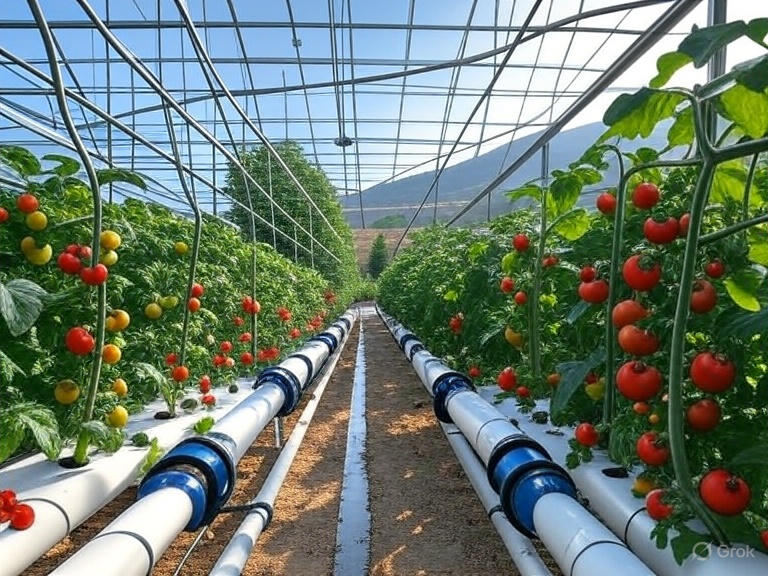Greece, with its Mediterranean climate, rich agricultural heritage, and growing environmental challenges, stands to gain significantly from adopting hydroponics—a soilless farming method that uses nutrient-rich water to grow crops. As traditional agriculture faces pressures from water scarcity, climate change, and market demands for year-round produce, hydroponics offers a sustainable, efficient, and high-yield alternative. This article explores the key benefits of hydroponics for Greek farmers, highlighting its potential to transform agriculture in regions like Crete, Thrace, and the Peloponnese.
1. Water Efficiency in a Water-Scarce Region
Water scarcity is a growing concern in Greece, particularly during prolonged heatwaves and droughts worsened by the climate crisis. Hydroponic systems use up to 90% less water than traditional soil-based farming by recycling nutrient solutions in closed-loop systems. This is a game-changer for arid regions like Crete, where water resources are limited. For example, hydroponic greenhouses like those operated by Agroshop SYNTAGI in Crete use drip irrigation and water recycling to produce tomatoes with minimal waste, ensuring sustainable water use while maintaining high productivity.
2. Year-Round Production and Market Stability
Greece’s mild winters and hot summers make it an ideal candidate for greenhouse-based hydroponics, enabling farmers to grow crops year-round. This ensures a steady supply of fresh produce, such as tomatoes, cucumbers, peppers, and herbs, even during off-seasons when prices for out-of-season vegetables soar. Facilities like Thrace Greenhouses in Neo Erasmio demonstrate this advantage, producing consistent yields of premium tomatoes and cucumbers regardless of external weather conditions, stabilizing local markets and reducing reliance on imports.
3. Higher Yields and Space Efficiency
Hydroponics can produce up to 10 times the yield per acre compared to traditional farming, making it ideal for Greece’s small landholdings and fragmented agricultural plots. Vertical farming and compact hydroponic systems allow farmers to maximize limited space, even in urban areas or on marginal land. Wonderplant in Drama, for instance, produces 15,000 tons of tomatoes annually on just a few hectares using advanced hydroponic technology, showcasing how Greek farmers can achieve high productivity without expansive farmland.
4. Environmental Sustainability
Hydroponics aligns with Greece’s push for eco-friendly agriculture by reducing the need for chemical pesticides and fertilizers. Controlled indoor environments minimize pest and disease risks, resulting in cleaner, high-quality produce that meets consumer demand for sustainable food. Additionally, facilities like Thrace Greenhouses leverage geothermal energy to power their operations, achieving near-zero carbon emissions. This not only lowers environmental impact but also appeals to export markets prioritizing sustainability, such as the EU.
5. Crop Diversity and Premium Quality
Hydroponics enables Greek farmers to grow a wide range of crops, from vegetables like lettuce and spinach to high-value floriculture products like roses and gerberas. The precise control over nutrients and growing conditions ensures superior crop quality, with enhanced flavor, nutrition, and shelf life. For example, Wonderplant’s hydroponic tomatoes are renowned for their premium quality, meeting the standards of both domestic and international markets. This versatility allows farmers to tap into niche markets and diversify income streams.
6. Resilience to Climate Challenges
Recent climate crises, including heatwaves and floods, have devastated traditional Greek agriculture, driving up produce prices and threatening food security. Hydroponics offers resilience by shielding crops from extreme weather and soil degradation. Greenhouses equipped with climate control systems, like those at GEOMARKET in Crete, protect plants from temperature fluctuations and storms, ensuring consistent production even during adverse conditions.
7. Economic Opportunities for Rural Communities
Adopting hydroponics can revitalize rural economies by creating jobs and attracting young farmers. Facilities like Wonderplant in Drama employ local workers and collaborate with agricultural cooperatives, fostering community development. By investing in hydroponic systems, farmers can access higher profit margins through premium pricing and reduced input costs, making agriculture a viable career path for the next generation.
Practical Steps for Adoption
To harness these benefits, Greek farmers can start small with affordable systems like Deep Water Culture or Nutrient Film Technique. Training programs, such as those offered by the Hellenic Open University (https://www.eap.gr), can equip farmers with the technical skills needed for nutrient management and system maintenance. Additionally, leveraging renewable energy sources like solar or geothermal, as seen in Thrace Greenhouses, can reduce operational costs and enhance sustainability.
Conclusion
Conclusion
Hydroponics offers Greek farmers a transformative opportunity to overcome environmental and economic challenges while meeting the growing demand for fresh, sustainable produce. Its water efficiency, high yields, and resilience to climate change make it a perfect fit for Greece’s agricultural landscape. By adopting hydroponics, farmers can ensure year-round production, improve crop quality, and contribute to a greener, more prosperous future. For those ready to take the leap, local agricultural cooperatives provide the tools and support needed to succeed in this innovative farming revolution.
